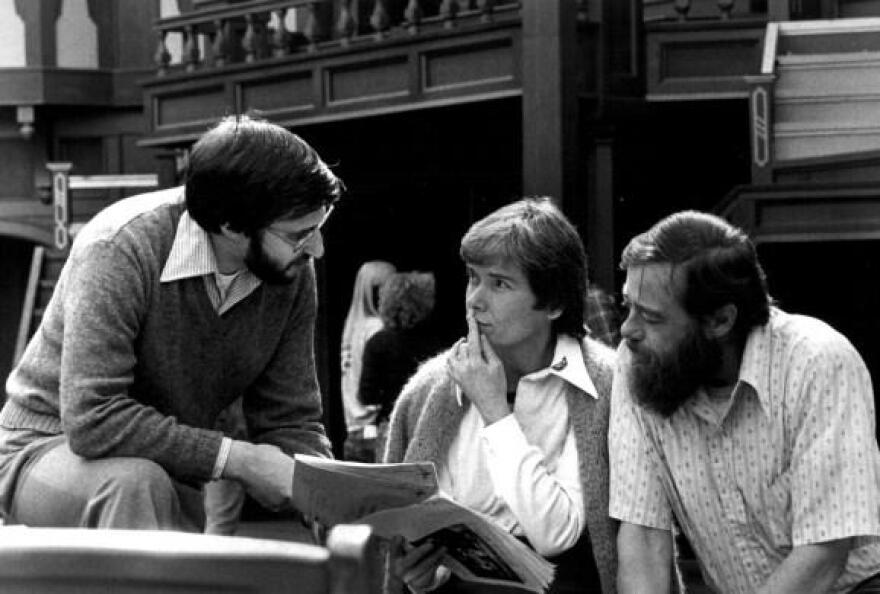On May 21st JPR celebrated its 50th anniversary. 50 years is a long time in the media world. Programming tastes change, technology changes -- and through the decades every successful media organization has needed to evolve and adapt. At the same time, every media enterprise that has endured has needed to remain true to itself -- to know who it is and what it’s trying to accomplish.
JPR’s journey has been an unlikely one. Most public radio operations rooted in very small media markets, like the ones JPR serves, have struggled to survive and to provide a baseline level of service to its listeners.
JPR has thrived, going well beyond the bare minimum to provide three separate and distinct program streams - a feat that has become an aspirational goal of many stations serving much larger, urban communities than those served by JPR.
But JPR has thrived, going well beyond the bare minimum to provide three separate and distinct program streams – a feat that has become an aspirational goal of many stations serving much larger, urban communities than those served by JPR. JPR’s success is due to many factors. We’ve been blessed with an incredibly generous audience, hungry for the programs we offer and passionate about what we stand for. We’ve had a consistently supportive institutional partner in Southern Oregon University (SOU), which has stuck by us in good times and bad and has always believed that our work is a valuable part of its regional educational mission.
And last, but certainly not least, we’ve been graced by a remarkable and committed group of people -- staff, volunteers and civic leaders -- who have imagined and worked hard to create a dynamic and diverse public radio service for our region.
First and foremost is JPR’s former Executive Director, Ronald Kramer. Ron came to JPR in 1974 as a consultant hired by then SOU President Jim Sours to determine if JPR’s flagship station, KSOR, could be something more than a campus radio station that provided a place for students to learn about broadcasting. Ron presented an ambitious vision of the station as an essential cultural institution for the community and agreed to stay to help realize that vision. Ron stayed for 38 years and led the development of many of the key ingredients that define JPR today.
When I think of the role Ron played in creating JPR I think of four things: his acumen navigating the complex world of the Federal Communications Commission to obtain the frequencies JPR uses to broadcast, his resolve that JPR could achieve things other operations our size couldn’t, his high standards, and his pursuit of a regional strategy to unite so many small communities to support our enterprise. Like most leaders who are ahead of their time, Ron’s vision had skeptics, but he relentlessly pursued his dream of what JPR could become and established a “JPR DNA” that is still very much a part of our culture today.
Steve Nelson served JPR for nearly a quarter of a century, spending 19 of those years as the President of the JPR Foundation.

He was a natural JPR champion who listened every day. His enthusiasm for our work and infectious optimism about our future enabled him to inspire others to support our mission.
His wise counsel made us a better organization. Steve passed away last year and we’re honored to have named the live performance studio in our new facility for Steve’s commitment to JPR.
John Patton designed and built most of KSOR’s translator system in the early days, which included seven solar powered installations at a time when solar power wasn’t very easy. He mounted translator antennas on cliffs and constructed the largest translator ever built at the time. Since many mountain top sites lacked the basic infrastructure to house radio equipment, John designed and built underground concrete vaults to help keep our equipment cool and humming along – a few of these vaults are still in use today. John once described hearing KSOR in Crescent City from the newly built Gasquet translator on a portable radio he held over his head as he walked into the Pacific Ocean noting, “I could not have been more thrilled if I were planting a banner on the summit of Mt. Everest.”
John Baxter became JPR’s Program Director in 1979 and spent over two decades as the programming heart of JPR. He managed the numerous live remote broadcasts JPR produced, including live broadcasts featuring the Oregon Shakespeare Festival, the Britt Festival Orchestra, the Rogue Valley Symphony, the Ashland City Band and the Oregon Coast Music Festival.

John was also the architect of the “split,” the initiative that created JPR’s three distinct program streams in 1991. John’s “can-do” attitude was emblematic of JPR. John and I slung cerveza together as bartenders at a local fundraiser for “El Sol Latino,” the first Spanish language radio program in the Rogue Valley, which aired on JPR’s News & Information Service. We were also partners in crime connecting JPR’s downtown Redding studio to the Old City Hall Arts Center across Market Street by stretching a cable from rooftop to rooftop in the dark of night in order to broadcast a program we called “Live from Old City Hall.”
The trail to modern day JPR has been blazed by many talented people who have believed in the power of public radio to create a better region, nation and world. While it’s impossible to name all those that have left a mark on what JPR has become, they all remain a vital part of the spirit that continues to propel us forward to serve our listeners in the decades ahead.




